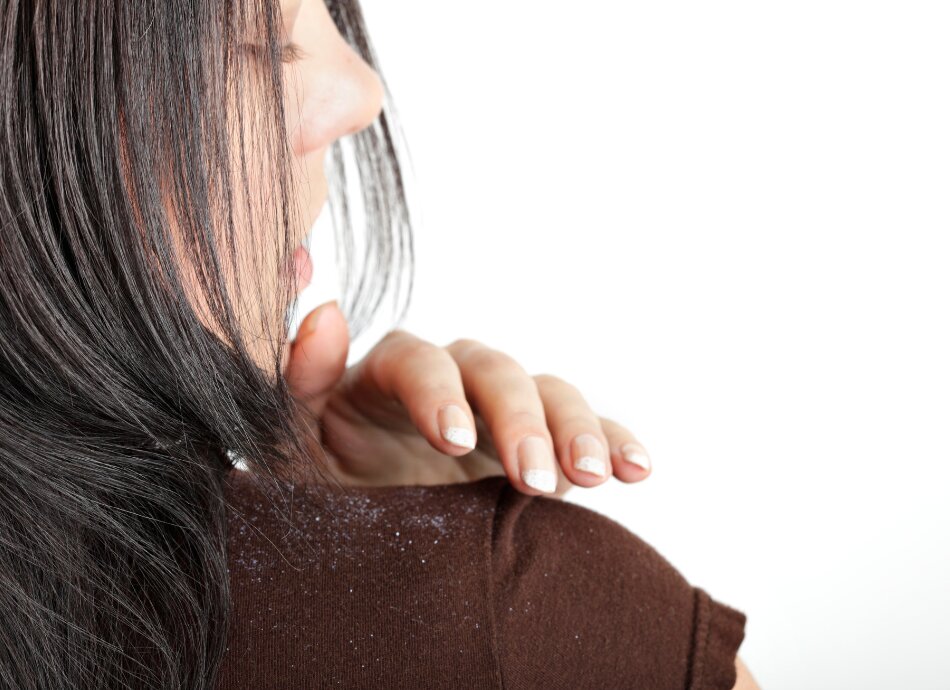Dandruff
Key points about dandruff
- If you have dandruff you might have an itchy scalp, and notice small skin flakes in your hair, eyebrows, and facial hair such as beard or moustache.
- Dandruff is not contagious or serious, but it might be annoying and embarrassing for you especially if your hair is dark.
- Learn more about dandruff, including videos about dandruff, and how to treat it.

If you have dandruff you might have an itchy scalp, and notice skin flakes in your hair, eyebrows, and facial hair such as beard or moustache. You might see skin flakes on your shoulders if you wear dark clothing. Dandruff is not contagious or serious, but it might be annoying and embarrassing for you especially if your hair is dark.
Video: What is dandruff? | Patient Explainers
This video may take a few moments to load.
(Patient UK, 2018)
Dandruff can have several causes including:
- Dry skin.
- Oily skin.
- Tinea capitis – a fungal infection of the scalp, also called scalp ringworm.
- A yeast-like fungus called malassezia that feeds on the oil on adult scalps (see video below). Malassezia yeasts have been linked to a number of other skin diseases including seborrhoeic dermatitis(external link)(external link) and pityriasis versicolor.(external link)(external link)
- A reaction or sensitivity to hair care products causing dermatitis.
- Other skin conditions like eczema or psoriasis.
Video: What causes dandruff, and how do you get rid of it? - Thomas L. Dawson
This video may take a few moments to load.
(TedEd, US, 2021)
Itchy and flaky dandruff can usually be controlled with a medicated shampoo. If your dandruff is mild, try a gentle shampoo first to reduce oil and skin cells building up on your scalp. If that doesn't help, try a medicated anti-dandruff shampoo, which you can buy at the chemist or supermarket. Ask your pharmacist if you need help.
Look for a shampoo containing one of the following ingredients:
- Zinc pyrithione
- Salicylic acid
- Selenium sulphide (or selenium sulfide)
- Ketoconazole
- Coal tar
There are many different dandruff shampoos, and each contains different active ingredients for controlling symptoms. To get the best results, always follow the instructions on the bottle. For example, some dandruff shampoos require that you lather the shampoo into the hair and scalp and leave the shampoo in for about 5 minutes before rinsing. Others should not be left on the scalp.
You might need to try more than one product to find the one that works best for you. Some of the stronger formulations are only available by prescription from your doctor.
Video: At-home dandruff treatment – dermatologist tips
You don't usually need to see your healthcare provider or skin specialist if you have dandruff, but it's a good idea to visit them if:
- You've tried anti-dandruff shampoos for at least a month and your symptoms haven't improved.
- Your dandruff is very severe or your scalp is very itchy.
- Your scalp is red or swollen.
- You have a weakened immune system, eg, if you're having chemotherapy, you have HIV, or you're taking medication that suppresses your immune system. Your GP can examine your scalp to check for skin conditions that could be causing your dandruff.
Seborrhoeic dermatitis(external link)(external link) Dermnet NZ
Dandruff(external link)(external link) Mayo Clinic, US
References
- Seborrhoeic dermatitis(external link)(external link) Dermnet NZ
- Dandruff(external link)(external link) Mayo Clinic, US
Credits: Healthify editorial team. Healthify is brought to you by Health Navigator Charitable Trust.
Reviewed by: Sandra Ponen, Pharmacist
Last reviewed:
Page last updated:





